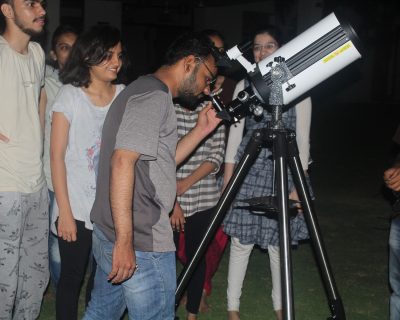ASTRONOMICA is a group of students and staff of the Physics & Electronics department of St. Xavier’s College, Ahmedabad which does various …
A vibrant and energetic environment of learning and doing

To groom young scholars of merit in Physics and Electronics with a right balance of intellectual, emotional and cultural growth. Inculcating a value system and nurturing sensitivity and tolerance towards fellow human beings, will be our priority.
An undergraduate programme in physics helps students to understand the basic concept of electricity, magnetism, thermodynamics, acoustics, optics, atoms, high energy particles to quantum physics, fluid dynamics and cosmology. Our physics curriculum at the undergraduate level focuses on making sure students get a clear understanding of motion, energy, electricity, magnetism, and the laws that govern the physical universe
Electronics is a branch of physics. It deals with emission, flow and control of electrons in vacuum as well as in matter. It dwells on design of circuits and the study of electrons under several of conditions. Electronics also describes the design, function, and utilization of electronic devices and systems. A degree in electronics includes a plethora of topics covered under physics, chemistry, mathematics, and engineering with its several applications in electronic as well as biomedical engineering.
The department initiated its Master’s Programme in Physics in the year 2019 with its aspiration being to be amongst the best physics departments in India by developing, nurturing and inspiring the careers of the next generation of physicists. Our mission is to champion fundamental and applied science, help students explore and connect physics with the world around them, and enable them to stay connected with science through research, academia or industry. We have forged strong partnerships with renowned centres of research excellence so that our students can work with scientists of repute and gain hands-on experience of the most advanced experimental techniques and the most sophisticated theoretical and experimental methods. Students can explore the vast expanse and depth of physics with our course that encompasses Quantum Mechanics, Atmospheric physics, Condensed Matter, Nano Science and Technology, Material Sciences, Nuclear Physics, Electronics and Theoretical Physics and much more. The research work in the final semester will provide an opportunity to select students to work at Institute of Plasma Research(IPR), Physical Research Laboratory(PRL), Space Application Centre(SAC) etc. This rigorous and challenging programme with an exciting curriculum will be led by a faculty who are not just experts with a significant portfolio of research work but dedicated and talented teachers to groom the next generation. Now, outstanding undergraduates can join our Master’s programme and make the next step towards becoming professional physicists/ researchers themselves.
This course enables students to explore exciting careers in national and international research laboratories related to the diverse branches of Physics, academic institutions, space organization, meteorology departments, medical industry. electronics industry, Public services, Armed forces and much more. (Poster to be included)
Introduced to initiate Third year B.Sc. and M.Sc. Physics & Electronics students for a career in the fields of:
This value added course is of 2 credits with a minimum intake of 10 students.
ASTRONOMICA is a group of students and staff of the Physics & Electronics department of St. Xavier’s College, Ahmedabad which does various …
The department collaborates with IPR in organizing and presenting various working and non-working models at their annual National Science day programme.
The department strongly believes that the education imparted to students has to find connectivity with the industry. This was the reason we …
The Advanced B. Sc (Physics) Programme was started by the joint efforts of Gujarat Science Academy and Vikram A. Sarabhai Community Science …

Lab Assistant

Lab Assistant

Lab Assistant